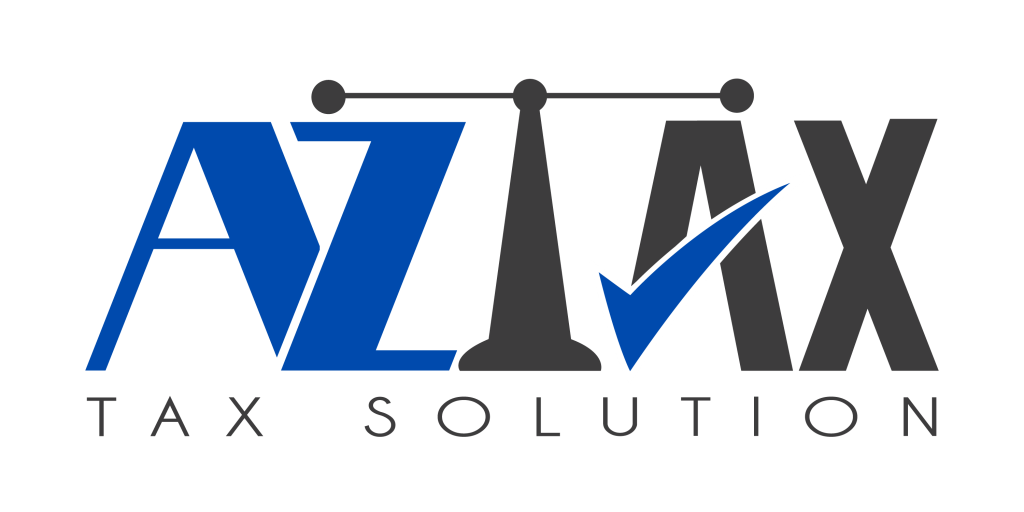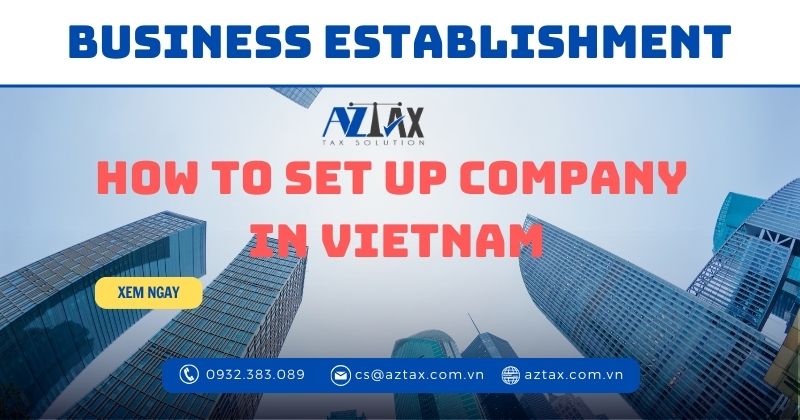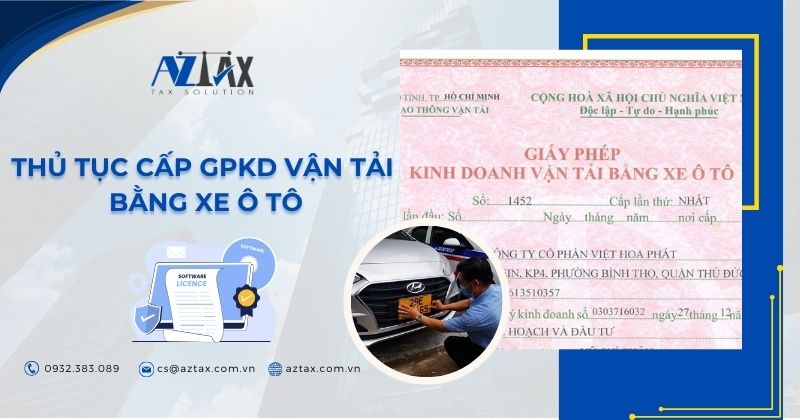How to setup company in Vietnam? Though Vietnam is a highly alluring destination for foreign investors, establishing a company here involves navigating a complex legal landscape. In this article, we delve into the setup procedures for companies looking to kickstart their operations in Vietnam. Rest assured, you don’t need to be overly concerned. AZTAX is here to guide you through each step of the company establishment process in Vietnam. Let’s read the following article with AZTAX to answer the question of how to start a business in Vietnam.
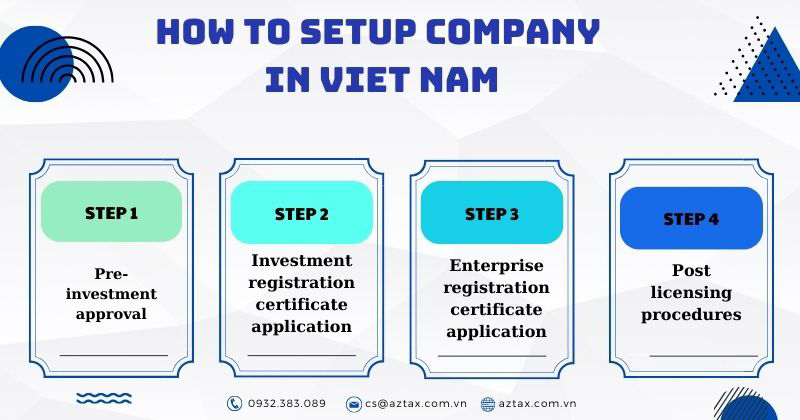
1. How to setup company in Vietnam
The process of establishing a company in Vietnam includes many different steps. Foreign investors need to complete all procedures and documents before starting operations. To make this process of Vietnam company incorporation simpler, AZTAX would like to summarize the business establishment process with the following 4 steps
Step 1 – Pre-investment approval
Due to extensive investment endeavors, Vietnam company formation is crucial for companies to secure approval from Vietnamese authorities before initiating the establishment procedures. Understanding whether an investment necessitates approval is key, and if so, preparing the required documentation while adhering to application processing timelines is vital.
Here’s a concise overview of the project categories that may entail additional special approvals:
- Construction of residential housing projects
- Airports, aerodromes, air transport businesses, cargo terminals, ports
- Petroleum processing
- Casinos and businesses involving betting
- Infrastructure projects for industrial zones and export-processing zones
- Nuclear power plants
- Golf courses
- Special land use rights
- Projects located on or near islands, borders, coastal areas, and other defense-sensitive locations
- Projects in sensitive heritage locations
- Projects that require relocation of inhabitants
- Projects that entail repurposing certain types of forests or rice crops.
Step 2 – Investment registration certificate application
The journey of Vietnam company formation will begin with applying for an Investment Registration Certificate (IRC). Mandatory for all foreign-owned investment projects, obtaining an IRC solidifies the foreign enterprise’s right to invest in Vietnam.
To initiate the application process, the investor should prepare the following:
- Application for the implementation of the investment project (inclusive of project details in Vietnam).
- Proposal for the investment project (encompassing project specifics, such as lease agreements or land use requirements).
- Financial statements (covering the last two years of the company’s operation; additional information may be required to substantiate financial capacity).
- Legal papers of the investors and their authorized representative (if the investor is an organization).
- Lease agreement or memorandum of understanding (MOU).
- Other documents pertaining to the investment project and requirements regarding the eligibility and capacity of the investor in accordance with applicable regulations.
Timeframe:
Typically, the processing time is 15 days from the submission of documents. However, in exceptional cases where the intended operating sector is not under WTO governance, this process may extend beyond the standard timeframe.
Step 3 – Enterprise registration certificate application
The Enterprise Registration Certificate (ERC) is a prerequisite for all projects aiming for company registration in Vietnam. Upon acquisition, the ERC will be assigned a number that serves as the entity’s tax registration number.
During the application process, the following information should be prepared:
- Application for enterprise registration.
- Company charter.
- List of all board members.
- List of legal representatives.
- Letters of appointment and authorization.
Step 4 – Post licensing procedures
After the issuance of the IRC and ERC, further steps must be undertaken to finalize the procedure and commence business operations. These steps encompass:
- Seal carving.
- Opening a bank account.
- Registered labor.
- Payment of business license tax.
- Contribution of charter capital.
- Public announcement of company establishment.
2. Compliance requirements for Vietnam company formation

For a corporation established in Vietnam, continuous corporate compliance is essential, encompassing:
Minimum Capital Requirements:
- For most sectors, Vietnam does not impose minimum capital requirements. However, the Department of Planning and Investment assesses registered capital to ensure it covers business expenses until revenue generation. While some businesses can start with less than USD 10,000, the amount varies based on the nature of the business. Certain sectors like Finance, Banking, Insurance, Fin-tech, Language centers or Vocational schools, and medical clinics may have specific capital requirements.
- It is advisable to verify if your business has minimum capital requirements, as the chosen and approved registered capital is reflected in the Business Registration Certificate, influencing how your company is perceived. Any changes to registered capital after initial registration will require a formal application procedure.
Charter Capital and Total Investment Capital:
- Charter Capital is the total value of capital and assets contributed by company owners during establishment. Total investment capital combines charter capital and loan capital. Registration of charter capital and total investment capital, including shareholders’ loans or third-party finance, and the company charter is required.
- Investors can modify the charter capital with prior approval from the local licensing authority once approved.
Capital Contribution Schedules:
- Investors must contribute capital within 90 days from FIE establishment unless otherwise approved by the licensing authority.
Transferring Capital to FIE:
- Foreign investors must open a capital bank account in a licensed bank to transfer capital into Vietnam. This account facilitates tracking capital flows and allows transfers for in-country payments and transactions.
Company Registered Address:
- A legal address in Vietnam is essential for business incorporation. Most businesses need a physical location, while service-based businesses may use a virtual office address. During incorporation, documents proving the chosen business address may be checked by the Department of Planning and Investment.
Company Legal Representative:
- At least one Legal Representative (LR) is mandatory, holding positions like Company President, Director, or General Director. LR requires a residential address in Vietnam. Residency status is preferable but not a qualifying requirement during incorporation. Foreign nationals involved need a work permit for Vietnam, applicable during or after the incorporation process.
Accounting and Tax Compliance:
- Ensuring the company’s adherence to accounting and tax regulations involves regular reporting, encompassing annual and quarterly submissions for corporate income tax, value-added tax, and personal income tax in accordance with Vietnam’s accounting standards. Additionally, there may be ad-hoc or periodic filings related to import and export tax and business license tax in various situations.
Annual Audit Compliance:
- Annual audit reports for both LLCs and Representative offices must be submitted within Vietnam’s designated annual finalization calendar, although the audit requirements for Representative offices are less stringent. An independent Vietnamese auditing firm is mandated to review your financial statements at the conclusion of each fiscal year.
Employment Compliance:
- Hiring personnel for your company necessitates strict adherence to Vietnam’s HR and employment laws, along with observance of the country’s national public holidays.
- Numerous requirements come into play, including restrictions on the types and quantities of employees, ensuring that foreign employees obtain and retain the required work permits and visas, and the registration and payment of employees’ social insurance as part of the payroll process.
Business License Tax and Special License Compliance
- Commencing from the second year of operation, companies are obligated to make annual payments for business license tax. Compliance and renewals may also be necessary for obtaining specific business licenses as mandated.
Foreign Investment Report Compliance
- Foreign investment reports must be submitted quarterly, semi-annually, and annually. These encompass the Report on Investment Implementation, submitted quarterly and annually, and the Report on Investment Supervision and Assessment, submitted semi-annually and annually.
3. How to choose forms of doing business in Vietnam
Investors arriving in Vietnam face a pivotal decision in selecting the most suitable form of investment. This step is extremely important for the development after the establishment of company. This choice involves careful consideration of the advantages and disadvantages associated with each option to apply business regisstration.
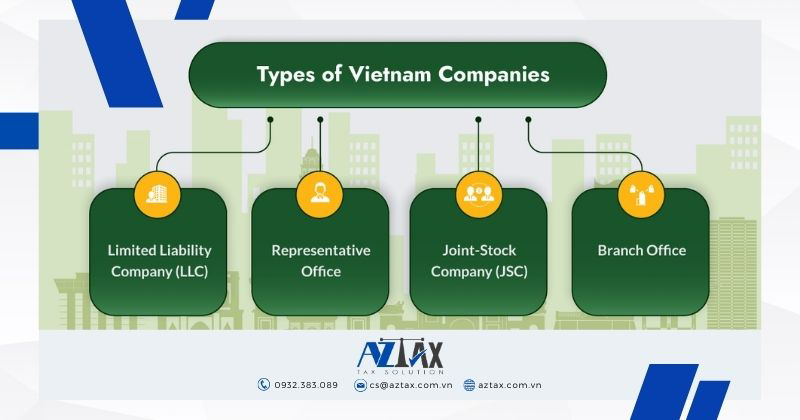
This article aims to delve into this matter, providing investors with a comprehensive understanding of investment forms in Vietnam. Below are some popular forms of businesses that you can choose for Setting a business in Vietnam. Step by step setup company in Vietnam for each type of business in Vietnam
Limited Liability Company (LLC):
- Multiple Members LLC: Comprising two to fifty members who may be organizations, individuals, or a combination of both.
- Single Member LLC: Owned by a single organization or individual member (“Company Owner”) responsible for the company’s debts and liabilities up to the charter capital amount.
Joint Stock Company (JSC):
- An enterprise with charter capital divided into shares held by three or more entities or individuals.
- Shareholders are liable for debts up to their contributed capital.
- Has the right to issue securities and may be listed on the Securities Exchange.
- May have common shares, preferred shares, and/or issued bonds.
- Partnership Company (PC):
- Established by at least two partners, akin to a limited liability partnership.
- General partners are fully liable for PC obligations, while limited partners are liable only to the extent of their capital contribution.
Business Cooperation Contract (BCC):
- A contractual relationship resembling a partnership, licensed for specific projects in Vietnam.
- Changing landscape with the entry of LLCs and JSCs into these fields.
Public-Private Partnership (PPP):
- Involves a contract (“PPP Project Contract”) between an authorized state agency and the investor/project enterprise.
- Conducted infrastructure projects or public services management and operations.
Other Means of Commercial Presence:
- Representative Office (RO): Allows foreign entities to have an institutional presence for market research and liaison, but is prohibited from direct profit-making activities.
- Branch Offices: Dependent units of foreign companies with restricted business types.
- Franchising.
- Technology Transfer.
4. Why do foreign companies invest in Vietnam?
Foreign investors are drawn to Vietnam for various compelling reasons when considering the establishment of a company. The country presents a highly favorable environment with notable attributes that make it an attractive business destination. In particular, the Vietnamese government always has appropriate policies to attract foreign investors.
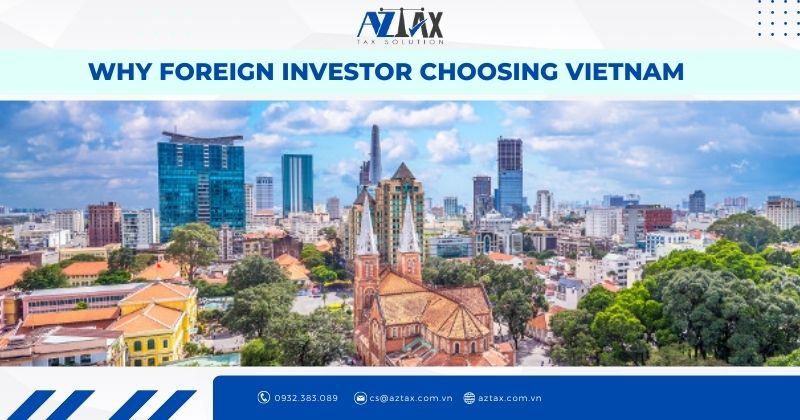
Below are some reasons why foreign investors choose Vietnam company registration:
- Firstly, Vietnam stands out with its rapidly expanding economy, marked by robust GDP growth and an inviting business climate. Market-oriented reforms have been successfully implemented, creating an environment that not only attracts foreign investment but also nurtures a dynamic entrepreneurial ecosystem.
- In addition to its economic prowess, Vietnam’s strategic geographical location serves as a gateway to the vibrant markets of Southeast Asia. Membership in regional trade agreements, including the Comprehensive and Progressive Agreement for Trans-Pacific Partnership (CPTPP) and the ASEAN Economic Community (AEC), grants investors access to a vast consumer base and advantageous trade conditions.
- Vietnam also boasts a young and skilled workforce with competitive labor costs, making it particularly appealing for industries involved in manufacturing and services. The government’s efforts to improve transparency, simplify administrative procedures, and enhance investor protection further demonstrate its commitment to facilitating smooth business operations.
- In essence, Vietnam emerges as a promising investment landscape, offering not only market potential but also strategic advantages and a supportive business and legal environment for investors looking to establish a company in the country.
5. In conclusion about company registration in Vietnam
The process of setting up a business in Vietnam requires a blend of legal acumen, cultural understanding, and strategic foresight. From obtaining the necessary approvals to aligning with local business practices, the journey demands careful consideration and a proactive approach. Engaging with professional assistance and leveraging local expertise can be instrumental in ensuring a smooth establishment process.
As the Vietnamese market continues to evolve and present new opportunities, setting up a company Vietnam in this dynamic landscape not only establishes a legal foothold but also positions businesses to thrive in a region of constant growth and innovation.
Hopefully, with the information provided, foreign investors can gain insights into the intricacies of how to set up a company in Vietnam. For further clarification or assistance, feel free to reach out to AZTAX using the contact details below. Our team is ready to provide comprehensive support and address any inquiries you may have regarding Vietnam company incorporation in Vietnam.
6. Some other questions related to Vietnamese market
Answers to frequently asked other questions about the Business Establishment in Vietnam
The capital of Vietnam is Hanoi. Hanoi, the capital of Vietnam, is renowned for its centuries-old architecture and a rich cultural tapestry influenced by the Southeast Asian, Chinese, and French regions. At the heart of the city lies the bustling Old Quarter, where narrow streets bear names associated with various goods. Numerous small temples, such as the Bach Ma Temple, honoring a legendary horse, dot the landscape alongside the vibrant Dong Xuan Market, offering household items and delectable street food.
Foreigners can own up to 100% shares in Vietnamese companies, but certain sectors like tourism and advertising require a Joint Venture Company. Vietnam follows WTO rules and always tries to simplify business law to attract foreign investors. This is also the reason why foreign investors like setting up a company in Vietnam. However Approval from the relevant ministry may be needed in cases of unclear business matters under WTO and local laws.
Abundant industrial zones, a readily available workforce, cost-effective labor, and a welcoming atmosphere for foreign direct investments position Vietnam as a premier “China plus one” destination. It stands out as a strategic choice for mitigating escalating expenses in China and navigating uncertainties like trade shocks.



